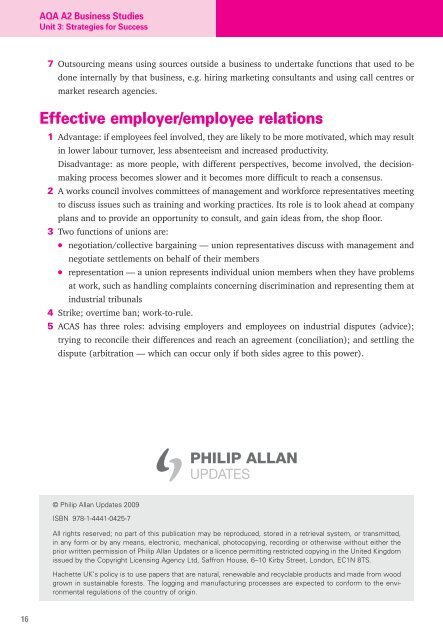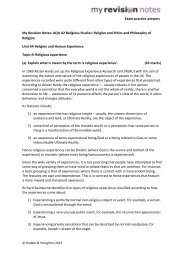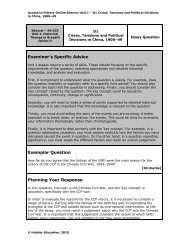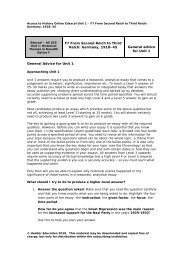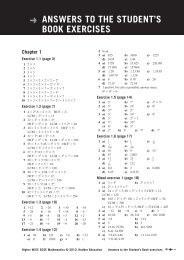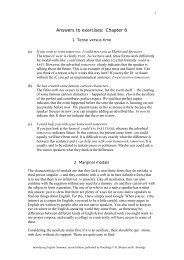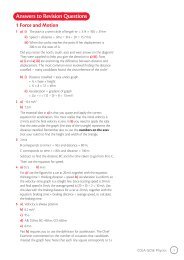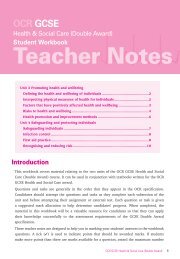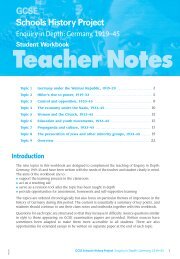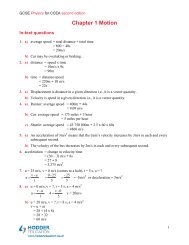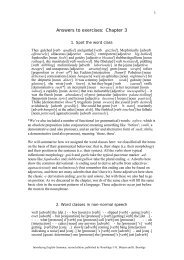A2 Business Studies Unit 3 Strategies for Success AQA
A2 Business Studies Unit 3 Strategies for Success AQA
A2 Business Studies Unit 3 Strategies for Success AQA
- No tags were found...
You also want an ePaper? Increase the reach of your titles
YUMPU automatically turns print PDFs into web optimized ePapers that Google loves.
<strong>AQA</strong> <strong>A2</strong> <strong>Business</strong> <strong>Studies</strong><strong>Unit</strong> 3: <strong>Strategies</strong> <strong>for</strong> <strong>Success</strong>7 Outsourcing means using sources outside a business to undertake functions that used to bedone internally by that business, e.g. hiring marketing consultants and using call centres ormarket research agencies.Effective employer/employee relations1 Advantage: if employees feel involved, they are likely to be more motivated, which may resultin lower labour turnover, less absenteeism and increased productivity.Disadvantage: as more people, with different perspectives, become involved, the decisionmakingprocess becomes slower and it becomes more difficult to reach a consensus.2 A works council involves committees of management and work<strong>for</strong>ce representatives meetingto discuss issues such as training and working practices. Its role is to look ahead at companyplans and to provide an opportunity to consult, and gain ideas from, the shop floor.3 Two functions of unions are:● negotiation/collective bargaining — union representatives discuss with management andnegotiate settlements on behalf of their members● representation — a union represents individual union members when they have problemsat work, such as handling complaints concerning discrimination and representing them atindustrial tribunals4 Strike; overtime ban; work-to-rule.5 ACAS has three roles: advising employers and employees on industrial disputes (advice);trying to reconcile their differences and reach an agreement (conciliation); and settling thedispute (arbitration — which can occur only if both sides agree to this power).© Philip Allan Updates 2009ISBN 978-1-4441-0425-7All rights reserved; no part of this publication may be reproduced, stored in a retrieval system, or transmitted,in any <strong>for</strong>m or by any means, electronic, mechanical, photocopying, recording or otherwise without either theprior written permission of Philip Allan Updates or a licence permitting restricted copying in the <strong>Unit</strong>ed Kingdomissued by the Copyright Licensing Agency Ltd, Saffron House, 6–10 Kirby Street, London, EC1N 8TS.Hachette UK’s policy is to use papers that are natural, renewable and recyclable products and made from woodgrown in sustainable <strong>for</strong>ests. The logging and manufacturing processes are expected to con<strong>for</strong>m to the environmentalregulations of the country of origin.16


